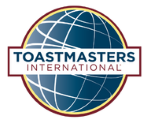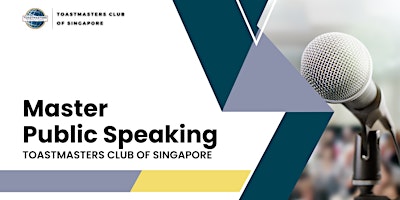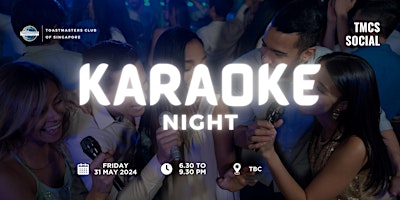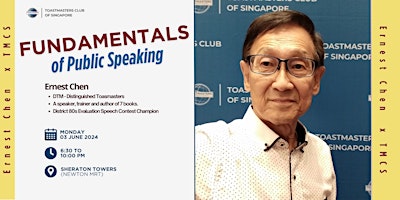
Farewell Piece from Todd Ho, President 2013/14
By: Todd Ho
It was a rainy day lacking of sunlight shining from the sky. The dark cloud had accurately depicted my stressed-up mind. The thunderstorm had timely spoken out my nervousness of being the newly-elected President of the Toastmasters Club of Singapore. It was the 1st of July 2013. I stood at the back corridor of a cafe, practicing my very first opening address repeatedly. Nothing could stop me from this mindless regurgitation. I was nervous. I did not care about the people looking at me. I did not care if I looked like a stranger talking to myself on the street. I put all my focus on getting myself ready. Finally, the time came. I gripped my hands tightly, walking up to the stage with a heavily loaded stomach, and presented my day-to-day well drafted strategy plan.
“I want to grow a team, a group of fighters to fight for the best for the club. I want to be in the team. I want to make everyone remember, that term 2013/14 Exco is the best in the club’s history, the best year for the Toastmasters Club of Singapore.” This was where everything, where the legend-in-the-making, got started.
Chua Chin Keong (VP Education 1) worked closely together with Rainer Huang (VP Education 2) and his successor Danny Ho (VP Education 1). With their hard work late into the night, calling our members to confirm their speaking slots, and persuading members to assume various appointments, we enjoyed some of the best toastmasters meetings and workshops throughout the year.
Sonice Chau (VP Membership 1) always encourages me, “Don’t worry, we know you are young. But we will support you no matter what is going to happen.” With her commitment and her social skills, she takes on different challenges every week, making our members and guests feel at ease at our chapter meetings, together with Tan Yi Han (VP Membership 2).
Sometimes, I wonder why we could have more than 20 guests on average per meeting. But when I look at the hard work and the improvements that Agostino De Angelis (VP Public Relations 1), Nancy Cheng (VP Public Relations 2) and Ho Wee Peng (Creative Media Advisor) have done for our webpage, Facebook page and Flickr, when I look at the many photos and advertisements and designs that they have created, realize that 20 guests per meeting is in fact a manifestation of their wonderful work.
It was a tough time when the Secretary (Dhanesh) left the team -- we were one man down. Fortunately for us, Teh Suk Yen arrived on the scene and saved the day. Assuming the role of Secretary, we went from running executive meetings without recording minutes to running the club with all proper documentations.
Kudos to Boredin Saengtuksin (Newsletter Editor), despite the temporary vacuum left behind before Suk Yen appeared, and the resignation of other newsletter editors, despite his heavy personal and work commitments, he still found the time to deliver well written and eye-catching bimonthly newsletters.
To monitor financial transactions and keep track the club’s finances, Huang Yaping (Treasurer) was an excellent asset keeper who helped the club to maintain a healthy financial status. With the help of Danny Ho (Internal Auditor 1) and especially Kelly Xue (Internal Auditor 2), the account for FY2014 was closed with a record high surplus.
Thanks to Haresh Paramesvaran (Sergeant at Arms) and his tireless efforts, we managed to bargain with Sheraton Hotel for a feasible package and arrange a consistently conducive environment for our meetings. He took up the challenges to be a negotiator for the club and helped us to secure a good contract which ultimately allowed us to remain at Sheraton at a reasonable cost. He also worked with Vicky Soo (Social Director 1) closely to organize our wonderful social outings. We had such great fun at these gatherings!
Finally, as the President of the Toastmasters Club of Singapore 2013/14, I gratefully thank my team members for their commitment and huge effort put into this club, this team, this legend. I do not think I will be able to find another team which can work together so closely, which can accommodate my relative inexperience and yet still support me as the leader of the club. I will never forget the moments spent working with this great team, the times we spent facing the challenges together, and of course, the joys we shared when success greeted us at the end of the way.
Today is a rainy day again, with scarce sunlight passing through the dark clouds, I felt nervous again, walking up to the stage to deliver my farewell speech. But this time I will not hold my hands tight. This time, I am glad to have you, my team, to walk together with me.
Tribute to President Todd
By: Anonymous member of the Exco (hint: someone handsome and popular)
Todd Ho was born on 8 September 1988 in Tseung Kwan O, located on the eastern side of Hongkong.
He was educated in Hong Kong till university (The Hong Kong University of Science & Technology HKUST), but due to some circumstances, he relocated to Singapore in his early twenties. While he was searching for a job, he stayed in his relative’s house. Although academically qualified, he found it challenging to communicate as his primary mother tongue is Cantonese. His shy and quiet persona makes it even harder for him to bring his messages across. During this period, he met a friend who introduced him to Toastmasters, and she brought him to TMCS. Todd instantly got attracted to this friendly place that helps everyone improve their communication and leadership skills holistically.
Though he signed up as a member, he felt incredibly awkward to talk in English, let alone deliver a speech. But that didn’t deter him – he participated in many table topics and jumped at any chance to help out in various appointment roles. One of the club mentors saw the potential in this quiet young man and encouraged him to take on an executive appointment as well as to become his mentor and friend. Within a year, he accomplished the Competent Communicator level.
In 2011, he took up the role of Vice President Educations, assisting the then-president Low Kim Heng. Along with the Exco team, this dynamic duo managed to clinch many awards for the club. By then, Todd had outgrown his introvert self and would no longer hesitate to go up to do a table topic. His eloquence had improved by leaps and bounds.
Because an Exco appointment is essentially a volunteer job, he had to undergo much hardship as he was furthering his studies and juggling his work at the same time. He was a very zealous young man who never missed a meeting. Help was scarce as most members are working adults but Todd, being Todd, always tried to arrive early to set up the meeting venue, stay back late to pack up, plan meetings early and help other members wherever he could. Yet, he never murmured a complaint.
In 2013, at the tender age of 25, the club unanimously voted for him to be the youngest ever president, for the term 2013-2014. Even when he was president, he was humble and approachable, winning the hearts of many members. As president, he always consulted the Exco and mentors before implementing anything because he believes that “TMCS is everyone’s club, not MY club”. What humility! Just in case you are wondering, his favourite phrase is “What do you think?”
In the role of club president, he tirelessly helped out in the area and district competitions, building personal rapport with many members from other TM clubs. During his tenure, TMCS achieved the highest recognition from Toastmasters International.
Todd, thank you for the untiring sacrifices that you made for this club, and for making the time we spent in this Exco very memorable. You have our deepest appreciation, and our greatest blessings in whatever you do in life. All the best, and good hunting!
The Girl That Looked Forlorn
By: Vicky Soo
Through the tunnel she stared
Never passing through, she never dared
She never knew the world on the other side
No matter how much her big eyes could open wide
She worried about the trains
And later of other things that kept her in rein
Just as her slippered feet remained rooted to the ground
By ancient believes she is bound
They brought back tales and bounty from the other side
But she always stopped, never crossing, she would abide
Would her life be different if she crossed
Would her fears and constraints be lost
She will never know because the chance has gone
For that girl who looked so forlorn
“Am I a born Public Speaker?”
By: Oh Hock-Chong, Club Mentor
 By: Jeffrey Herbert Williams
By: Jeffrey Herbert Williams
In today’s uncertain business climate and fast-changing economy, it is more important than ever to find the competitive edge and allow your organization to stay ahead of competition. In particular in a country like Singapore, HR managers and professionals are looking into unique training programmes and development to ensure the best practices for organizations in meeting the crucial phase of people development. As human resources gain further insights into managing the roles that people play in today’s working environment, investing in people development becomes a top priority.
By investing in training and development, HR practitioners and managers are giving a strong signal that the only way to engage people and for them to contribute effectively to the organization’s goals and mission, they must invest in training and development. In replicating those patterns of excellence in training and development, they believe it will achieve any desired results on a consistent basis. They also believe that there is no failure, only feedback, so if you aren’t getting the results you want, keep changing what you are doing until you get the results you finally desire.
By taking a systemic approach to businesses, we are also prudent in implementing interventions that could bring about short-term gain but long-term pain. For example, when many organizations face difficult times they will often cut back on essential areas like training and laying-off workers. How does this affect the business in the long term? With consistent investment in training and people-oriented development, we look at alternative choices – what are the different ways to make things happen and for what will be the effects of making a change on the whole system? Several organizations that I have worked with have supported training elements within their departments in order to attract and retain the best talents. They are strong advocates for investing in training and developing people skills as they believe that it is a strong element to bring out the best in each employee in their performing roles.
What are the objectives then for these organizations mentioned? There are several areas that we will focus on for the critical success factors of these organizations:
a. Build employees’ motivation
b. Increase work productivity and performance
c. Develop effective people skills
d. Increase organizational cohesion
e. Build a more dynamic and profitable organization through effective leadership
f. Improve core competencies in critical areas of sales, marketing and finance
What are the proposed intervention and action steps in both consulting and training approach for these organizations in the case study?
There are 3 different phases:
Phase 1
Understanding and redefining corporate culture
These organizations consistently revisited this area of competence and redefined their strategic planning system, their corporate values, mission and vision; Mastering negotiation skills for conflict resolution, realigning individual employee’s values to fit corporate needs; Implementation of new Performance Management System to increase organizational cohesion; Creating an objective performance appraisal system to build employees’ motivation and so on. Understanding the concept of cultivating empowering skills in the organization and stressing the importance of ownership was also another vital critical success factor for these organizations. These organizations also cultivated the essential act of incentivizing and providing a rewards system for all employees.
Phase 2
Build employees’ motivation and increase work productivity
What did these organizations do to build employees’ intrinsic motivation and increase work productivity? They invested heavily through various training and development programmes and took the initiative to look into the personality profiling of each employee and leveraging on their strengths to certain job functions which best suited their character, personality and capability. Critically, it enhanced the skill sets and work attitude towards the roles they would play in the organizational functions. For example, after training, employees were involved in the following:
a. Delegating responsibilities and practicing transformational leadership
b. Unleashing the highest potential in them in the various roles within the organization
c. Improving their communication skills at all levels of the organizational hierarchy
d. Providing them the platform to coordinate effective team building projects to enhance camaraderie amongst the management and the employees within the organization
Phase 3
Motivating factors to improve employees’ general skill sets
What were the motivating factors in training and development that improved employees’ general skillsets for these organizations? There were several areas in which they worked on successfully:
a. Improving customer service and relationship management (CRM)
b. Elevating Business Etiquette and Professionalism within the organization
c. Cultivating an Empowering Skills’ mindset to gain trust and confidence from the management
d. Fostering Team Spirit and Discipline through Team Building projects
e. Understanding and appreciating the various people culture in the organization
f. Implementation of Key Performance Indicators (KPIs) to reward each employee and hence to keep them happy and motivated to perform
Employees perform best when given the opportunity to excel in their roles and responsibilities. How do we know the true value of their capabilities to contribute to the organization? One of the best ways to find out is to invest in training and development and only time will tell.
Article Contribution by: Jeffrey Herbert Williams, a professional trainer and coach
Behind the Next Door: a Personal Note from a New Member who Won First Runner-Up at the International Speech Contest, Distrct 80 Annual Convention 2014
By: Theo Davies
Theo Davies won 2nd place at the International Speech Contest recently held in Bangkok. Here is what he has to share about his great achievement:
“My speech topic was ‘Behind the Next Door’ and it was a speech about persistence and how often people don’t realize that a life changing opportunity may lie ahead if you just keep plugging away despite the pain and frustration that surround you.
It felt pretty amazing to win this considering I joined the Toastmasters less than two years ago! It shows you just how much you can grow and improve with the help and guidance of other Toastmasters and the amazing platform that our club has. I remember moments such as forgetting my speech on stage and am really happy with the amount of growth since then and I am very thankful to each and every person who has helped along the way!”

















